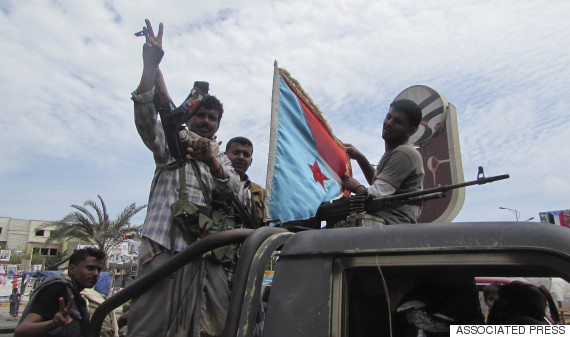
The rapidly escalating crisis in Yemen continues to bring chaos to the country as forces of the Shiite Houthi militia drive south in an aim to take the port city of Aden. Their advance has forced President Abed Rabbo Mansour Hadi to flee from Aden to an undisclosed location, The Associated Press reported Wednesday.
The crisis in Yemen is one with many different groups and moving parts to it. The Houthis, who now control the capital of Sanaa and much of the nation's northern regions, are engaged in a bitter fight against some Sunni tribes in the country, and clashes have claimed hundreds of lives. On the other hand, the militants of the al Qaeda affiliate in the region, AQAP, have vowed to eradicate the Shiite fighters with attacks and suicide bombings.
Now the Islamic State militants, too, are claiming a role in the violence, and last Friday carried out multiple suicide bombings at two of the capital's Shiite mosques, killing at least 137 people.
The WorldPost presents a roundup of some of the best analysis and reporting on Yemen to help clarify the chaos.
Who Are The Houthis?
Gregory D. Johnsen, an author on Yemeni politics, provides an in-depth account for Buzzfeed of how what was once "just a few men, disaffected students and farmers" is now a group in control of large parts of the nation. Johnsen details the timeline of their rising influence, and the complicated power dynamics that led to the current violence.
In a report on the state of Yemen since the Houthi takeover, Mona El-Naggar of The New York Times offers a look at what life is like in the capital:
The Threat Of Sectarian Violence
According to former Middle East correspondent Brian Whitaker, Friday's IS-linked bombings were a game-changer in Yemen's rapid descent into chaos. "Friday’s mosque attacks, whoever was behind them, will intensify sectarian rivalries and invite bloody reprisals," Whitaker argues in an op-ed for The Guardian. "The scene is set for a protracted civil war."
Whitaker believes that while the violent standoff between Hadi's government, the Houthis and the militants of al Qaeda had pushed Yemen to the brink of disintegration, the recent sectarian attacks have tipped the country over the edge. The longer the conflict lasts, Whitaker notes, the stronger the chances that countries like Iran and Saudi Arabia will double down on support for their proxies -- the Houthis and the Sunni tribes, respectively -- intensifying the conflict.
Contrary to countries like Iraq and Syria, where sectarian violence has wreaked havoc in recent years, sectarian attacks like those perpetrated last week are an anomaly. That has changed with the rise of the Houthis, Ghaith Abdul-Ahad reports for The Guardian from Sanaa. He explains that the Houthis' power grab has invigorated the "militarization and radicalization in the Sunni-majority Yemeni heartland, acting as a recruiter for jihadis."
 In this photo taken on Friday, March 20, 2015, militiamen loyal to President Abed Rabbo Mansour Hadi ride on an army vehicle on a street in Aden, Yemen. (AP Photo/Yassir Hassan)
In this photo taken on Friday, March 20, 2015, militiamen loyal to President Abed Rabbo Mansour Hadi ride on an army vehicle on a street in Aden, Yemen. (AP Photo/Yassir Hassan)
The Role Of The International Community
Farea al-Muslimi, a visiting scholar at Carnegie Middle East, criticized the international community, and the United Nations in particular, for forcing Yemen's political actors to continue a process of reconciliation following the ouster of former President Ali Abdullah Saleh that has done more harm than good. "The world has walked Yemenis into this process and should take responsibility for that. They have broken Yemen and it is time to pay for it," he wrote in a piercing op-ed published in The National.
Al-Muslimi states:
Violence and a declining quality of life have come to represent Yemen. The number of Yemenis now subsumed by the country’s continuing humanitarian crisis numbers 16 million. Basic functioning services have all become as rare as birthdays -- a once a year event.
At the moment, Yemen’s once quiet streets and civic spaces have turned into spaces for militias and unknown suicide bombers. In Sanaa, no one but death walks freely or safely.
The Effect On American Policy
Reporting for the New York Times, Eric Schmitt looks at the consequences of the United States' decision to pull back 125 U.S. Special Operations advisors in the wake of the increased violence.
Hadi's government has been a crucial partner in America's global counterterrorism strategy and its fight against AQAP -- considered the most capable jihadi affiliate worldwide.
"The loss of Yemen as a base for American counterterrorism training, advising and intelligence-gathering carries major implications not just there, but throughout a region that officials say poses the most grievous threat to United States global interests and to the country itself," Schmitt writes.
Schmitt's colleague at the Times, David D. Kirkpatrick, sums up the grim situation facing Yemen in a report on the Houthi clashes near Aden.
As Kirkpatrick puts it: "Yemen is sliding toward a civil war with ominous elements of a sectarian feud, a regional proxy conflict, the attempted return of an ousted authoritarian, and the expansion of anti-Western extremist groups like Al Qaeda and the Islamic State eager to capitalize on the chaos."
More from The WorldPost on the crisis in Yemen:
- What You Need To Know About The Houthi Militia In Yemen- Yemen's Capital Fell To A Rebel Group And The World Hardly Noticed

